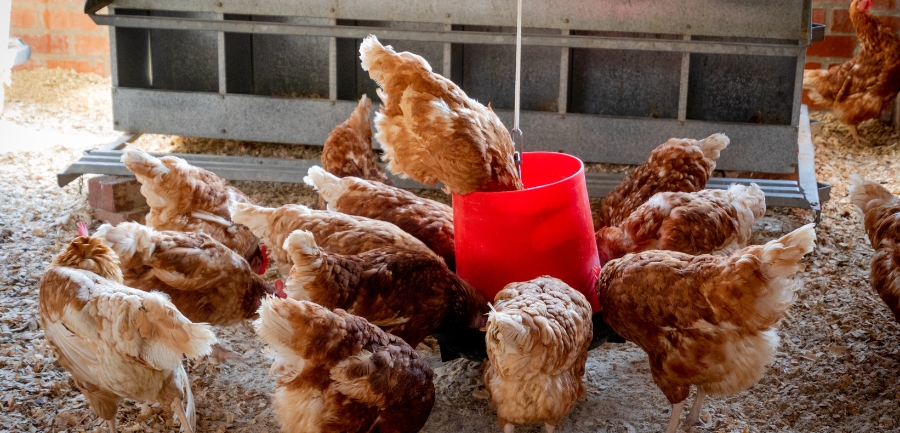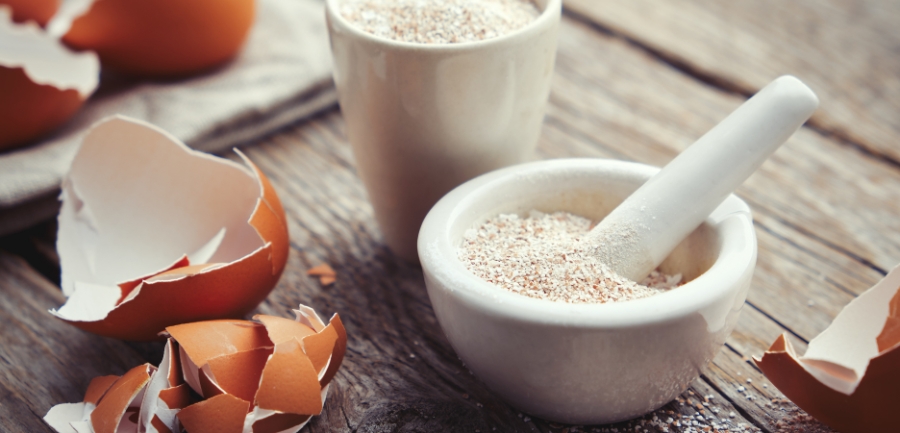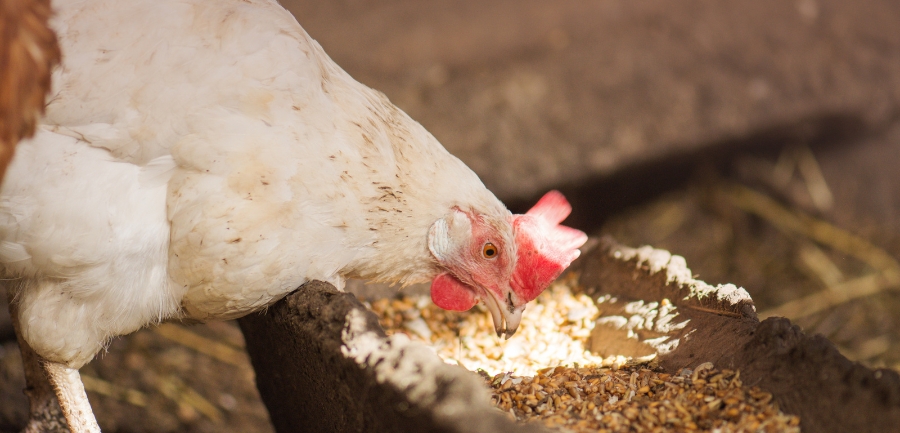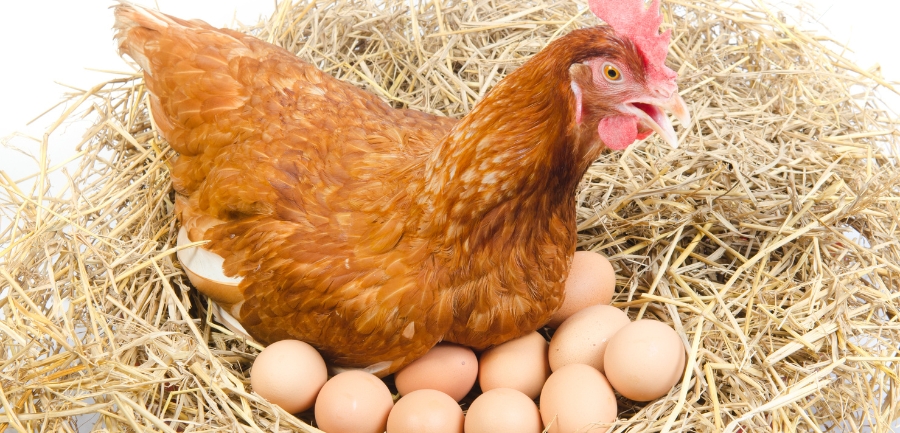Hey there, fellow chicken enthusiasts!
If you’re anything like me, you take the health of your feathered friends very seriously. Making ensuring they’re content and fed isn’t enough; you really need to know what you can do to help them flourish. And one of those essential nutrients that often gets overlooked is calcium.
Table of Contents
You might be wondering, why calcium? Well, let me tell you, it’s not just for building strong bones in humans; calcium plays a vital role in our chickens’ health too. Just like us, they need it to build strong bones and, most importantly, to lay beautiful and sturdy eggs.
When a hen doesn’t get enough calcium, her eggshells can become thin and fragile. Trust me, you don’t want to go collecting eggs only to find them broken in the nesting box! But it’s not just about the eggs. A lack of calcium can lead to various health issues for your chickens, affecting their quality of life.
Now, you may be thinking, “Where do I find calcium for my chickens? How do I add it to their diet?” Don’t worry; I’ve got you covered! In this detailed guide, we’ll talk about calcium’s function in the body, how it affects egg formation, and where you can get some. Whether you want to go the store-bought route or prefer to whip up some homemade calcium treats, there’s something for every chicken keeper here.
So grab a cup of your favorite brew, settle in, and let’s dive into the wonderful world of calcium for chickens. Your hens will thank you with clucks of approval and a bounty of strong, healthy eggs!
Understanding Calcium for Chickens

Calcium isn’t just a fancy word we throw around when talking about a healthy diet; it’s the building block for our chickens’ well-being. In this section, we’ll delve into the heart of why calcium is so crucial, what it does for our hens’ bodies, and how to spot if they’re not getting enough. It’s like a mini masterclass in chicken health, so let’s get started!
Why Calcium is Essential
Role in Bone Health
Do you know that saying about birds having hollow bones? Well, that’s not entirely true, especially for our chickens. Their bones need to be strong and sturdy to support their daily activities. Calcium is like the superhero of bone health, swooping in to ensure that the bones are robust and resilient. Without enough calcium, their bones can become weak, leading to potential health problems.
Impact on Eggshell Strength and Quality
Ever cracked open an egg and noticed how the shell feels? That’s calcium at work! A chicken’s body uses nearly 95% of the calcium it consumes to create those strong eggshells. When there’s not enough calcium, the shells can become thin and fragile, just like your favorite delicate china. If you love those fresh farm eggs like I do, making sure your hens get enough calcium is key.
Calcium in Eggs

Amount of Calcium Found in Eggshells
An eggshell is more than just a protective casing; it’s a calcium powerhouse. About 40% of the eggshell’s weight is pure calcium. That’s a lot of goodness packed into such a small package!
Importance in a Chicken’s Diet
Feeding eggshells back to your chickens isn’t just a sustainable practice; it’s like giving them a calcium-rich treat. By understanding the calcium content in eggshells, we can provide them with a natural source of this essential mineral. It’s like a circle of life, but for eggs!
Signs of Calcium Deficiency in Chickens

Symptoms to Watch For
Just like you can feel a bit off when you’re not eating right, chickens show signs when they’re low on calcium. Keep an eye out for thin or weak eggshells, changes in laying patterns, and even lethargy. Your chickens might be trying to tell you something!
But here’s a really tell-tale sign: If you notice that your hens are eating their eggshells after laying them, it’s a clear indication that they’re craving more calcium. It’s their instinctual way of trying to replenish what’s missing. Consider it a gentle nudge from your feathered friends that they need a little extra calcium love in their diet.
Long-term Effects
A continuous lack of calcium isn’t just a fleeting issue; it can have serious long-term effects. From weak bones that are more prone to fractures to decreased egg production, calcium deficiency is a concern that needs prompt attention.
Homemade Calcium for Chickens

If you’re like me and love a good DIY project, then this section is going to excite you. Providing calcium for your chickens doesn’t have to mean a trip to the feed store. In fact, some of the best sources of calcium might be right in your kitchen! In this article, we’ll look into the process of using eggshells to create calcium-rich treats for your hens. As surprising as it may sound, it’s quite simple.
How to Bake Egg Shells for Chickens
Importance of Baking Eggshells
Before you feed those eggshells back to your chickens, it’s crucial to bake them first. Baking not only dries the shells but also removes any lingering bacteria. Think of it as sterilizing a precious gift for your hens.
Step-by-Step Instructions on How to Bake Egg Shells
- Collect and Clean: Save the eggshells from your kitchen, and give them a good rinse to remove any egg whites.
- Preheat the Oven: Set your oven to 250°F (120°C) – it’s the perfect temperature to dry without burning.
- Arrange on a Baking Sheet: Spread the eggshells out on a baking sheet in a single layer.
- Bake: Pop them in the oven and let the transformation begin!
- Cool and Crush: Once cooled, crush the shells into small, manageable pieces for your chickens to enjoy.
How long to bake egg shells for chickens?
- Duration: Around 10-15 minutes should do the trick.
- Temperature: Keep it at 250°F (120°C) to gently dry the shells.
- Preparation Tips: You can crush the shells slightly before baking to ensure even drying.
How to Dry Eggshells

Maybe you’re looking for an alternative to baking, or perhaps you want to try something new. Drying eggshells is another excellent way to prepare them for your chickens.
- Clean the Eggshells: Same as before, give those shells a good rinse.
- Let Them Air Dry: You can simply spread them out on a clean towel or paper and let them air dry naturally.
- Use a Dehydrator (Optional): If you have a food dehydrator, this can speed up the process.
- Crush and Store: Once dry, crush the shells and store them in an airtight container.
Usage of Homemade Calcium Supplements
Dried eggshells can be mixed with other chicken feed or used as a separate supplement. It’s a cost-effective and natural way to boost your chickens’ calcium intake. Plus, it’s a satisfying feeling knowing you created this nutritious treat right in your own kitchen!
Other Calcium-Rich Foods for Chickens
If you thought baking and drying eggshells was fun, wait until you see what else you can feed your chickens to boost their calcium intake! From hard-boiled eggs to scrambled delights, there’s more to the chicken menu than you might think. Let’s explore these culinary treats that are not just delicious but packed with calcium goodness!
Can Chickens Eat Hard-Boiled Eggs?

Exploring the Nutritional Value
Surprise! Chickens can indeed eat hard-boiled eggs, and they love them. Rich in protein and calcium, hard-boiled eggs are like a power-packed snack for your hens.
Preparation and Feeding Guidelines
- Boil the Eggs: Cook them until the yolks are firm.
- Cool and Chop: Allow the eggs to cool, then chop them into bite-sized pieces.
- Serve: You can mix them with regular feed or serve them as a special treat.
- Caution: Make sure to remove any shell fragments to avoid confusion with fresh eggs.
Can Chickens Eat Scrambled Eggs?
Nutritional Benefits
Just like the hard-boiled variety, scrambled eggs are a hit with chickens. They provide essential proteins, vitamins, and, of course, calcium.
How to Properly Prepare Scrambled Eggs for Chickens
- Scramble the Eggs: Cook them without any salt, butter, or oil.
- Cool: Let them cool down to room temperature.
- Serve: Serve them plain or mix them with other chicken treats.
Egg Crushed: Benefits and How to Serve
The Benefits of Crushed Eggshells
Eggshells are more than just a byproduct of your breakfast; they’re a calcium treasure trove! When crushed, they become an easily digestible source of calcium for your hens.
Serving Suggestions and Guidelines
- Crush Properly: Ensure the shells are crushed into small, manageable pieces.
- Mix with Feed: You can blend the crushed shells with regular chicken feed.
- Serve Separately: Alternatively, place them in a separate dish for pecking.
- Monitor Intake: Watch your chickens to ensure they’re enjoying this new addition to their diet.
Precautions and Tips for Feeding Calcium to Chickens
When caring for our feathered friends, a little extra attention goes a long way. As exciting as it is to provide homemade calcium sources, there are some precautions to keep in mind. This section provides the knowledge you need to keep your flock healthy and happy, from the science behind baking eggshells to the need to not go beyond.
Do You Have to Bake Egg Shells for Chickens?

Exploring the Reasons Behind Baking Egg Shells
Baking eggshells isn’t just a culinary twist; it’s a safety step. Baking helps to:
- Kill Potential Bacteria: Raw eggshells might contain harmful bacteria, and baking eradicates them.
- Dry the Shells: This makes them easier to crush and digest.
Safety Precautions and Why It Is Recommended
Baking eggshells ensures they are safe and suitable for your chickens. It’s an extra effort that can make a big difference in the quality and safety of your homemade calcium source. Here’s why it’s recommended:
- Reduces Risk of Disease: By killing off any potential pathogens, you protect your flock.
- Improves Texture: Baked and dried shells crush easily and are more palatable for chickens.
Avoiding Over-supplementation
Risks Associated with Too Much Calcium
While calcium is undoubtedly vital, like anything in life, too much of it can lead to problems. Over-supplementation may cause:
- Kidney Issues: Excess calcium can lead to kidney stones or other renal problems in chickens.
- Interference with Other Nutrients: High levels of calcium can affect the absorption of other vital nutrients like phosphorus.
How to Ensure a Balanced Diet
Ensuring a balanced diet isn’t just about adding calcium; it’s about maintaining harmony in your chickens’ nutritional intake. Here’s how you can do that:
- Monitor Eggshell Quality: Keep an eye on the eggshells. They are a clear indicator of calcium levels in your chickens.
- Consult a Veterinarian or Nutritionist: If in doubt, professional advice can help tailor the perfect diet for your flock.
- Follow Recommended Guidelines: When using supplements, always adhere to the recommended dosage and guidelines.
To Wrap It Up
Calcium, a mineral found in many foods, is crucial to your chickens’ well-being since it helps them grow strong bones and eggshells. In this article, we will discuss the usage of eggshells and other egg preparations as well as other innovative and handmade sources of calcium. We’ve also gone over some basic measures you may take to keep them healthy and secure in their nutrition.
Why not explore and experiment with these methods? Providing calcium doesn’t have to be complicated; with a little creativity and care, you can make delightful and nutritious treats right in your kitchen. Embrace the joy of nourishing your chickens and happy feeding!
FAQs
What can I give my chickens for calcium?
You can provide chickens with calcium through crushed eggshells, oyster shells, or specialized calcium supplements found at feed stores. Experimenting with different sources can be rewarding.
How do I give my chickens enough calcium?
Ensure enough calcium by mixing crushed eggshells or oyster shells with their feed or providing a separate dish. Follow recommended guidelines or consult a veterinarian for specific needs.
What are the symptoms of calcium deficiency in chickens?
Calcium deficiency in chickens can lead to thin or weak eggshells, changes in laying patterns, and lethargy. Chickens may even eat their eggshells to compensate for the deficiency.
What percentage of calcium do chickens need?
Chickens typically require between 3.25% to 4.5% calcium in their diet, depending on their age and laying stage. Precise needs can vary, so professional guidance can be helpful.

